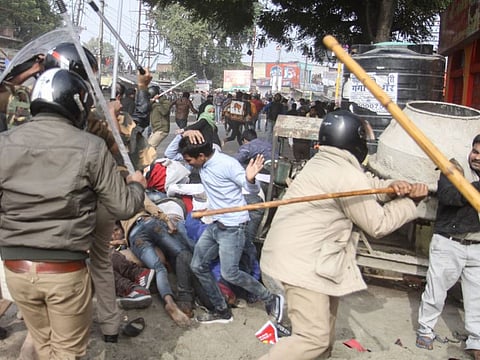Citizenship Act: India’s ruling BJP must win back trust
Swelling protests and a rising death toll are signs of strain on country’s social fabric

The growing protests in India and the rising death toll — more than 14 people have died so far — are signs of a disconsolation that has descended on the country, due to the passing into law of the Citizenship (Amendment) Bill on December 11.
Why has the Citizenship (Amendment) Act (CAA) caused such distress?
The reasons are many.
As it now stands, the CAA offers undocumented migrants from six religious minorities — Hindus, Sikhs, Buddhists, Jains, Parsis and Christians — from Afghanistan, Bangladesh and Pakistan, rights to Indian citizenship.
Markedly, the list of minorities does not include Muslims.
Against this anomalous background, India’s ruling Bharatiya Janata Party (BJP) has sought to explain that the CAA, and its all-India rollout, will in no way be inimical to Muslims but many fear that the community will be further marginalised.
This deficit of trust that took root within the Muslim community when the BJP came to power in 2014, is one of the driving forces behind the protests.
There is also the issue of the CAA’s constitutional validity.
Also Read: Citizenship Act breaks the promise of India
Experts in India are questioning its intent in the face of Article 14 of the Indian Constitution that upholds the right to equality for all religions.
Many are also questioning the CAA’s potential to disturb the demographics of states in India at the socio-cultural and socio-economic levels as well as its manner of implementation, which remains unclear, given its contradictory ambitions.
Even as these questions beg for answers, the handling of the protests in itself is gaining attention. The use of force — security forces showed no hesitation in rough-handling protesters from college students to women to even the country’s most renowned historian — the digital embargo, or the imposition of Article 144 (that prohibits a gathering of more than four persons at a time in public places) are only exacerbating the situation and prompting doubts on the upholding of democratic rights in India.
If the BJP wants people to understand its passion for the CAA — and the proposed nationwide rollout of National Register of Citizens (NRC), another flashpoint that raises concerns on just who will be targeted in this national head count — as being in the genuine interests of the nation, it needs to work harder on winning back the trust of all Indians, especially the Muslim community.



